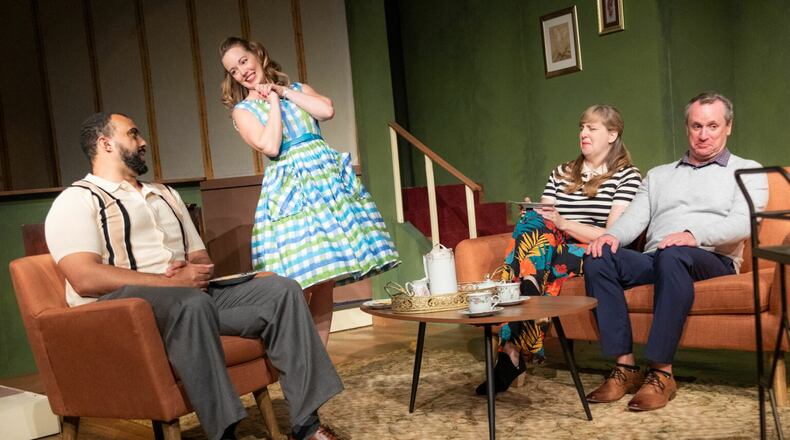This story was originally published by ArtsATL.
“Home, I’m Darling,” which runs at Synchronicity Theatre through Oct. 29, opens with a scene familiar to anyone who’s watched 1950s domestic sitcoms like “Leave It to Beaver” or “Father Knows Best.”
Over breakfast, we meet Judy (Bethany Anne Lind) and Johnny (Marcus Hopkins-Turner). Judy’s dress is impeccable as she glides around the kitchen preparing breakfast for her husband. She does every little task so that he barely needs to lift a finger, including breaking the top of his hard-boiled egg. Their conversational pitter-patter covers food, home planning and, of course, declarations of utter happiness that seem surely too good to be true.
But there’s a twist. Shortly after Judy sends Johnny on his way to work — making sure to hand him his lunchbox and briefcase — she returns to the kitchen, reaches under the sink and pulls out a laptop. Turns out, we’re living in the 21st century, and this may have more in common with “Black Mirror” than “Ozzie and Harriet.”
In “Home, I’m Darling,” British playwright Laura Wade takes a familiar theme — the rigid and suffocating gender roles baked into the marriage and family structure of the mid-20th century and the role that pop culture played in propagandizing it — and flips it around.
Credit: Casey Gardner Ford
Credit: Casey Gardner Ford
In this scenario, protagonist Judy has opted into this kind of regressive arrangement, coaxing her reluctant husband into trying to live out the 1950s as an “experiment” because she favors what she views as the simplicity and kindness of that era.
Obviously, this is an extreme fantasy, bordering on delusion and is something that Johnny seems to be struggling with more and more. Judy’s mother, Sylvia, played with delightful take-no-B.S. brassiness by Shelly McCook, is quick to point out that those glossy celluloid depictions of Doris Day and Rock Hudson had no real bearing on what life was actually like for women in the 1950s.
“This is a cartoon,” Sylvia says of her daughter’s dolled-up house and attire. She points out that they were still rationing in the immediate aftermath of World War II and didn’t have amenities like central heat in the winter, which meant it was always cold.
We find out that striving toward domestic goddess status is Judy’s form of rebellion, having grown up in a commune where absolutely no one cleaned up ever. “My filthy childhood,” she says with a nervous laugh.
Eventually, we also learn that things were more balanced and normal in the past. Johnny used to do most of the cooking and liked it. And Judy had a successful career in finance, making more money than Johnny. As the story progresses, it becomes clear that no longer making two incomes has created a serious gap in their finances, as it would with most households today.
Credit: Casey Gardner Ford
Credit: Casey Gardner Ford
This couple is clearly dedicated to each other, helped by the easy chemistry between the two leads, but their rules for how to operate in this setup are nebulous. For instance, Judy has abandoned having a cellphone in favor of good old-fashioned landlines, but she frequently finds her retro chic outfits on eBay.
In one dynamic scene, Johnny invites over his new boss, a young woman named Alex (played with snappy comic timing by Lizzy Liu), who rightfully balks at the setup when she walks in and then begins to poke holes in the structure of this exercise. For instance, she points out, the 1950s may have been great if you were straight, heterosexual, white, male and rich, but not so much for anyone else, and particularly not if you were Black or gay.
“Would you go to a hospital with modern medicine?” Alex asks. “Of course,” Judy snaps back. “We’re not a religious cult.” Potayto, potahto.
When the play debuted in London right before the pandemic, it garnered rave reviews, particularly for its lead, British comedian and actor Katherine Parkinson (recognizable as a core cast member of workplace comedy “The IT Crowd”). It also won the Lawrence Olivier Award for the best new comedy play in 2019.
The role of Judy is tricky because she must be funny in her misguided notions but remain sympathetic so that we never fully turn away from rooting for her — like Johnny and Sylvia seem to be — to come back to her senses. And on that tightrope balancing act, Lind nails it, confidently holding our attention, even in wordless moments when she’s frantically trying to keep the bubble from bursting.
As fissures in this veneer of perfection begin to grow, Judy’s desperation to cling to the beautiful paper house she’s constructed around them grows more profound.
The subject of 1950s sitcoms and their incongruity with harsher realities has gotten the cinematic treatment before, often in much more dramatic ways, from the when-eras-collide fantasy comedy “Pleasantville” to last year’s dystopian thriller “Don’t Worry Darling.” And then there’s the horror angle that “Stepford Wives” perfected 50 years ago.
But this show mines the dark comedy in this kind of scenario for all it’s worth. We get some nice jabs at our ongoing glorification of nostalgia that never quite gets the full, messy picture of what that decade was like to live through. Wade also brings in some “Me Too” themes in a couple later scenes, which serve as a stark reminder of the misogyny still permeating our culture.
Most of all, Wade’s script zooms in on how this nostalgia for things we’ve never experienced firsthand can permeate our present-day relationship dynamics. Who has not at one point or another worn different identities or tried out different idealized scenarios for the sake of maintaining appearances or connections?
Shoutouts to the snazzy sound design by Dan Bauman and pitch-perfect scenic design by Dustin Pettegrew. Aided by the charm and chemistry of the cast and the cleverness of Synchronicity Artistic Director Rachel May’s direction, this show offers a trip through time you’ll want to take.
THEATER REVIEW
“Home, I’m Darling”
Through Oct. 29. 8 p.m. Wednesdays–Saturdays; 5 p.m. Sundays. $30-$45 and “pay-what-you-can” Wednesdays. Synchronicity Theatre, 1545 Peachtree St., Atlanta. 404-484-8636, synchrotheatre.com.
::
Alexis Hauk has written and edited for numerous newspapers, alt-weeklies, trade publications and national magazines, including Time, The Atlantic, Mental Floss, Uproxx and Washingtonian. Having grown up in Decatur, Alexis returned to Atlanta in 2018 after a decade living in Boston, Washington, D.C., New York City and Los Angeles. By day, she works in health communications. By night, she enjoys covering the arts and being Batman.
Credit: ArtsATL
Credit: ArtsATL
MEET OUR PARTNER
ArtsATL (www.artsatl.org), is a nonprofit organization that plays a critical role in educating and informing audiences about metro Atlanta’s arts and culture. Founded in 2009, ArtsATL’s goal is to help build a sustainable arts community contributing to the economic and cultural health of the city.If you have any questions about this partnership or others, please contact Senior Manager of Partnerships Nicole Williams at nicole.williams@ajc.com.
About the Author
Keep Reading
The Latest
Featured





